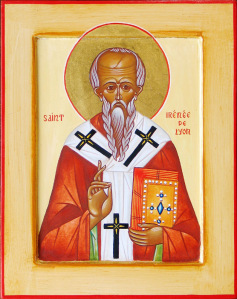 Continued from here….
Continued from here….
If He was not born, neither did He die. And, if He died not, neither did He rise from the dead.
And, if He rose not from the dead, neither did He vanquish death and bring its reign to nought.
And if death be not vanquished, how can we ascend to life, who from the beginning have fallen under death?
So then those who take away redemption from man, and believe not in God that He will raise them from the dead, these also despise the birth of our Lord.
This He underwent on our behalf, that the Word of God should be made flesh in order that He might manifest the resurrection of the flesh, and might have pre-eminence over all things in the heavens, as the first-born and eldest offspring of the thought of the Father, the Word, fulfilling all things, and Himself guiding and ruling upon earth.
For He was the Virgin’s first-born, a just and holy man, godfearing, good, well-pleasing to God, perfect in all ways, and delivering from hell all who follow after Him. For He Himself was the first-begotten of the dead, the Prince and Author of life unto God.
Thus then the Word of God in all things hath the pre-eminence; for that He is true man and Wonderful Counsellor and Mighty God, calling men anew to communion with God, that by communion with Him we may partake of incorruption.
He was proclaimed by the law through Moses, and by the prophets of the Most High and Almighty God, as Son of the Father of all – He from whom all things are, He who spake with Moses.
He came into Judaea, generated from God by the Holy Spirit, and born of the Virgin Mary, even of her who was of the seed of David and of Abraham, Jesus the Anointed of God, showing Himself to be the One who was proclaimed beforehand by the prophets.
And His forerunner was John the Baptist who prepared and made ready the people beforehand for the reception of the Word of life; declaring that He was the Christ, on whom the Spirit of God rested, mingling with His flesh.
His disciples…, after receiving the power of the Holy Spirit, were sent forth by Him into all the world, and wrought the calling of the Gentiles, showing to mankind the way of life, to turn them from idols and fornication and covetousness, cleansing their souls and bodies by the baptism of water and of the Holy Spirit.
This Holy Spirit they had received of the Lord, and they distributed and imparted It to them that believed; and thus they ordered and established the Churches.
Irenaeus of Lyons (2nd century AD – c. 202): Demonstration of the Apostolic Preaching, 39-41 [slightly adapted].








